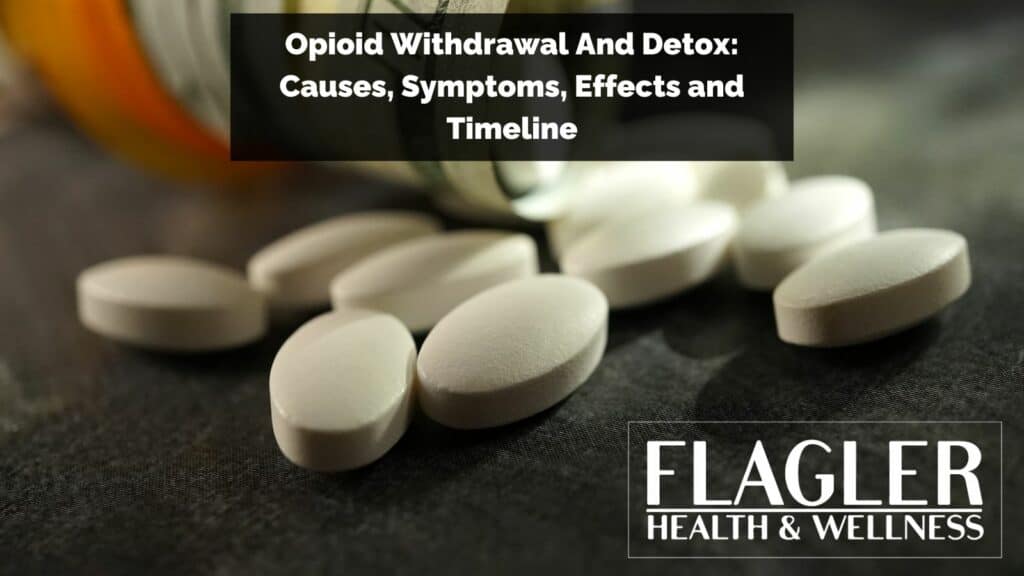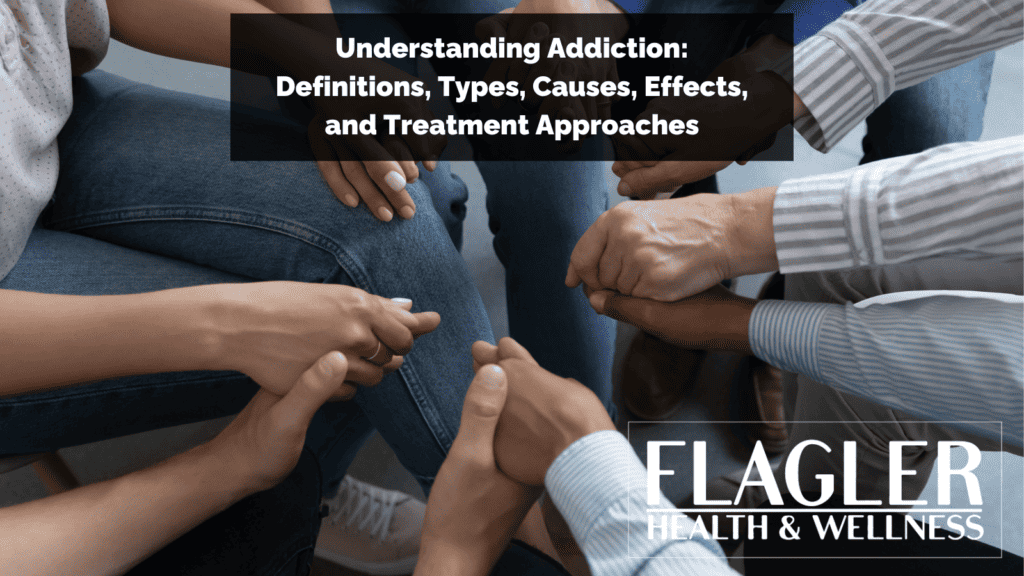Opioid withdrawal is the challenging process that individuals experience when they stop using or significantly reduce their intake of opioid drugs such as heroin, fentanyl, and oxycodone. The absence of opioids causes a cascade of physiological and psychological symptoms that mark the beginning of the withdrawal process.
Some symptoms of opioid withdrawal include fever, chills, sweating, bone pain, and disrupted sleep patterns. It’s also common to experience intense and sometimes overwhelming cravings for opioids along psychological symptoms such as depression and anxiety.
The effects of opioid withdrawal can be debilitating, impacting both physical and mental well-being. Severe or prolonged depression is another effect of opioid withdrawal, which calls for long term treatment.
The Difference Between Opioid Withdrawal And Opioid Detox
Opioid withdrawal is the body’s natural response to someone stopping or significantly reducing their opioid use while opioid detox is a structured, supervised medical intervention to safely remove opioids from the body. While withdrawal is a challenging phase, detox aims to manage symptoms and create a foundation for further treatment and recovery.
Symptoms of opioid withdrawal can manifest in various ways, including:
- Physical discomfort such as chills, sweating, and fever
- Psychological challenges like anxiety and depression
- Cravings for opioids as the body readjusts to functioning without them
Opioid detox aims to manage and alleviate withdrawal symptoms, providing a safer and more comfortable experience for the individual. During detox, healthcare professionals monitor the individual’s health, administering medication and support to ease withdrawal symptoms.
The process not only addresses the physical aspects of addiction but also prepares the individual for the next stages of recovery, which may include therapy, counseling, and long-term addiction management strategies.
What is the Cause of Opioid Withdrawal?
Opioid withdrawal is caused primarily by the neurobiological effects of opioids. Opioids release feel good neurotransmitters, which can numb pain and lead to states of euphoria, which can lead to a physical and psychological dependence.
Stopping opioid use disrupts withdrawal symptoms and disrupts the balance of neurotransmitters in the brain, leading to feelings of anxiety and depression among other symptoms.
Understanding the causes of opioid withdrawal is crucial because it will help professionals and individuals seeking help develop and find tailored treatment plans to support the recovery process.
When Does Opioid Withdrawal Start?
Opioid withdrawal starts anywhere from a few hours to a day and a half after your last dose, depending on the type of opioid. Withdrawal for short-acting opioids like heroin begins 8-12 hours after the last dose, while withdrawal symptoms for long-acting opioids like fentanyl may not appear until 36 hours after the last dose.
Symptoms Of Opioid Withdrawal During Detox
The symptoms of opioid withdrawal during detox can be challenging, both physically and mentally. Individuals undergoing detox may experience a range of symptoms, including but not limited to:
Physical Symptoms
- Intense Drug Cravings
- Bone and Muscle Pain
- Flu-like Symptoms including fever, chills, and excessive sweating
- Nausea and vomiting, often accompanied by stomach cramps
- Tremors and Shaking
- Hot and Cold Flushes
- Fatigue and Weakness
- Insomnia
- Increased Heart Rate and Blood Pressure
Psychological Symptoms
- Anxiety and Agitation
- Depression
- Mood Swings
- Irritability
- Confusion and Disorientation
- Hallucinations and Delusions
- Cravings for Opioids
These symptoms can vary in intensity and duration, depending on an individual’s history of opioid use, overall health, and the presence of co-occurring mental health conditions. Proper medical supervision during detox can help manage these symptoms effectively, ensuring a safer and more comfortable detox process.
Effects Of Opioid Withdrawal (Long-Term and Short-Term)
Short-term effects of opioid withdrawal include acute physical and psychological symptoms, while long-term effects can include lasting changes in mood, mental health, and overall well-being. Long term side effects can last for months, highlighting the need for an ongoing commitment to a recovery plan.
What Happens During Opioid Withdrawal?
During opioid withdrawal a person’s brain and body are adjusting to the absence of the drug, and will respond with a range of symptoms. Understanding what happens during this phase is crucial for those undergoing withdrawal and their support systems.
Adjustments in the Brain
- Neurotransmitter Imbalance: Opioids affect the production and release of neurotransmitters in the brain. During withdrawal, the sudden absence of opioids disrupts this balance, leading to various symptoms.
- Chemical Reactions: The brain, accustomed to the presence of opioids, now has to recalibrate its chemical processes, which can affect mood, pain perception, and overall cognitive function.
Physical Responses
- Physiological Changes: The body has to readjust to functioning without opioids, which can affect multiple systems including the digestive, nervous, and cardiovascular systems.
- Activation of Withdrawal Symptoms: As the body tries to regain equilibrium, it may exhibit a range of physical symptoms, reflecting the physiological dependency that had developed.
Psychological Impact
- Emotional Fluctuations: The absence of opioids can lead to significant mood swings and emotional responses, as the brain’s chemistry adjusts.
- Cravings: Psychological cravings for opioids are common as the brain seeks to return to the state of opioid-induced euphoria.
Factors that Affect Opioid Withdrawal
There are several factors that can impact the severity and duration of opioid withdrawal, which will vary from person to person. Understanding these factors can help you set yourself up for success. Some key factors include:
- Co-occurring Mental Health Issues: Conditions such as depression and anxiety can exacerbate withdrawal symptoms and increase a person’s risk of relapse.
- Polydrug Use: Using other substances at the same time with opioid drugs will affect and complicate the withdrawal process, leading to more severe or unpredictable symptoms.
- Duration and Intensity of Opioid Use: Longer periods of opioid use as well as higher doses of opioid drugs typically result in more intense withdrawal symptoms.
- Individual Physiology and Genetics: Each person’s unique physical makeup influences how their body processes and withdraws from opioids.
- Age and Overall Health: Older individuals may experience more intense or prolonged withdrawal symptoms.Pre-existing health conditions can also complicate the withdrawal process.
- Detox Environment: A supportive and controlled environment can significantly impact the success of the detox process. Medical supervision saves lives and can ease the intensity of withdrawal symptoms.
- Previous Withdrawal Experiences: Individuals who have undergone withdrawal in the past may have a different experience in subsequent detox attempts.
By considering these factors, healthcare professionals and individuals can better prepare for and manage the challenges of opioid withdrawal. Tailoring the approach to each person’s unique situation is key to effectively navigating the detox process and setting the stage for successful long-term recovery.
How to Treat Opioid Withdrawal
The best way to treat opioid withdrawal is with a medically supervised detox, at least in the initial stages. This ensures that your body will stay hydrated which is a common issue with opioid withdrawal, and that you will be monitored 24/7 in the case of complications or a medical emergency. Other forms of support, such as consistent therapy in an inpatient and or outpatient setting can be a necessary part of achieving positive recovery outcomes.
Treatment Plan for Opioid Withdrawal during Detox
In addition to counseling and therapy, a comprehensive treatment plan for opioid withdrawal during detox may include medication-assisted treatment (MAT) with medications like methadone which can help manage withdrawal symptoms and cravings.
How Long Does Opioid Withdrawal Take During Detox?
The duration of opioid withdrawal during detox varies widely among individuals. On average, the acute withdrawal phase may last for several days to a week. However, the overall timeline is influenced by factors such as the severity of addiction, the specific opioid used, and individual physiology.
What Influences Opioid Withdrawal and Detox Timeline?
Several factors influence the timeline of opioid withdrawal and detox, including a person’s age, weight, and overall health, as well as their history of opioid use. Higher doses and longer periods of opioid use tend to mean a longer and more intense withdrawal process.
Can I Die from Opioid Withdrawal?
Yes, it is possible for someone to die from opioid withdrawal. It is best not to assume that an opioid withdrawal can be handled safely at home or on your own – always seek professional medical assistance during detox.
Can Opioid Withdrawal Cause Seizures?
Yes. Although it is a rare complication, opioid withdrawal may lead to seizures and other potentially dangerous symptoms and side effects, emphasizing the importance of medical supervision during detox. Here are some key points to consider:
- What Causes Seizures: When someone suddenly stops using opioids, the brain’s chemical balance is disrupted, which can trigger seizures in vulnerable individuals. These seizures are a result of the central nervous system’s overactivity as it reacts to the absence of opioids.
- Factors That Increase Risk Of Seizure: Some factors include a history of seizures, polydrug use, and long term use and or higher doses of opioid drugs.
- Symptoms Indicating Seizure Risk: Unusual neurological symptoms such as intense tremors or loss of consciousness during withdrawal may signal an increased risk of seizures. Severe headaches, confusion, or heightened agitation can all indicate a potential seizure.
- Preventive Measures: Gradually tapering off of opioids under medical guidance can help minimize the risk of seizures. Medication-Assisted Treatment (MAT) can also help stabilize a person’s condition and reduce withdrawal symptoms, including the risk of seizures.
- Post-Seizure Care: In the event of a seizure, immediate medical care is essential to ensure patient safety and to assess and treat any underlying issues. Continuous monitoring and adjustment of the detox plan may be necessary if a seizure occurs.
How To Cope with Opioid Withdrawal
Coping with opioid withdrawal can be very challenging, which is why it’s important to have plenty of support available. Here are different kinds of support you may need during the withdrawal process:
Medical Support and Supervision
- Medically Supervised Detox: Attending a detox program under medical supervision is crucial. It ensures that medical assistance is readily available, especially in the case of severe withdrawal symptoms or emergencies.
- Medication-Assisted Treatment (MAT): Medication can help manage withdrawal symptoms and cravings, making the process more bearable.
Lifestyle Adjustments
- Rest and Sleep: Getting plenty of deep rest is vital. The body needs time to heal and recuperate during the withdrawal process.
- Nutrition: Eating a balanced diet rich in nutrients supports the body’s recovery. Nutritious food can help replenish what the body has lost during opioid use.
- Hydration: Staying hydrated is key. Withdrawal often leads to fluid loss, so it’s important to drink enough water.
Psychological and Emotional Support
- Support Groups: Support groups like Narcotics Anonymous can provide emotional support and a sense of community.
- Counseling and Therapy: Professional psychological support can help address the underlying issues related to opioid use and develop coping strategies.
- Mindfulness Techniques: Practices like meditation, yoga, and mindfulness can help manage stress and improve mental well-being.
Environmental Considerations
- Nature and Outdoor Activities: Spending time in nature can have a calming effect and promote a sense of well-being.
- Supportive Social Environment: Surrounding oneself with supportive friends and loved ones can provide emotional comfort and encouragement.
Get Help At Flagler
At Flagler, we offer a range of treatment options to assist individuals struggling with an opioid addiction. Our treatment programs are designed to support you and help you build a strong foundation for the life you’d like to lead.. No matter where you are on your recovery journey, there is always help available. Reach out to us today for more information about how our heroin treatment programs can help you or a loved one.
Share This Post







